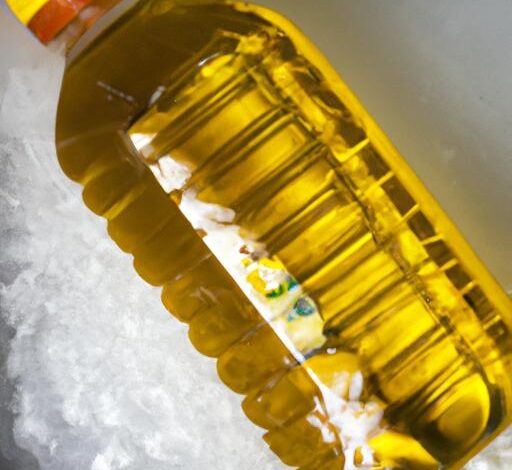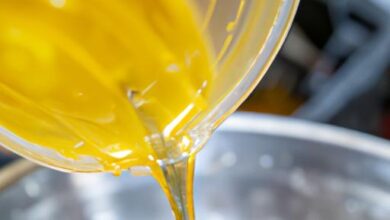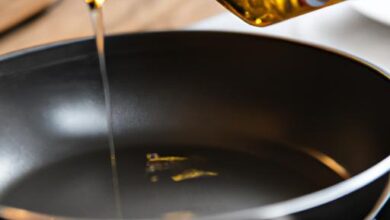Will Cooking Oil Freeze?

Cooking oil is a staple in every kitchen, but have you ever wondered if it can freeze? As the temperatures drop, it’s important to know how freezing temperatures can affect substances like cooking oil. In this article, we will explore the concept of freezing temperatures and its impact on cooking oil. So, let’s dive in and find out if your cooking oil is at risk of freezing!
When we think of freezing temperatures, we often associate them with ice and snow. But did you know that these frigid temperatures can also affect other substances, including cooking oil? Freezing occurs when a substance reaches its freezing point, causing it to solidify. Understanding if cooking oil can freeze is essential for proper storage and usage.
Now, you might be wondering why it’s crucial to know if cooking oil can freeze. Well, imagine this scenario: you’re in the middle of preparing a delicious meal, and you reach for your bottle of cooking oil, only to find it has turned into a solid block. Not only would this be inconvenient, but it could also impact the quality and taste of your dishes.
In the next sections, we will delve deeper into the freezing points of cooking oil, the factors that influence its freezing point, and the effects of freezing on its quality and usability. So, stick around to learn more about the fascinating science behind cooking oil and freezing temperatures.
Understanding Freezing Points
Have you ever wondered what exactly freezing point means and why it’s significant? Let’s start by clarifying this concept.
Definition of Freezing Point and its Significance
The freezing point of a substance refers to the temperature at which it transitions from a liquid state to a solid state. It is the point at which the substance’s molecules slow down and arrange themselves into a fixed pattern, forming a solid. For cooking oil, the freezing point determines whether it will remain in its liquid form or solidify when exposed to low temperatures.
Understanding the freezing point of cooking oil is essential because it helps us determine its usability under different conditions. By knowing the freezing point, we can take necessary precautions to ensure our cooking oil remains in a usable state and avoid any surprises in the kitchen.
Factors that Influence the Freezing Point of a Substance
Several factors come into play when determining the freezing point of a substance. These factors can vary depending on the composition and properties of the substance. When it comes to cooking oil, some key factors that influence its freezing point include:
-
Molecular Structure: The molecular structure of the cooking oil plays a crucial role in determining its freezing point. Different types of cooking oils contain varying proportions of saturated and unsaturated fats, which affect their freezing points.
-
Impurities and Additives: The presence of impurities or additives in cooking oil can alter its freezing point. For instance, refined oils may have a lower freezing point compared to unrefined oils due to the removal of impurities during the refining process.
Why Different Types of Cooking Oils Have Different Freezing Points
Each type of cooking oil has a unique composition, which contributes to its distinct freezing point. For example, oils with a higher percentage of saturated fats tend to have a higher freezing point, as saturated fats have a more organized molecular structure that solidifies at higher temperatures. On the other hand, oils with a higher proportion of unsaturated fats have a lower freezing point because their molecular structure is more fluid and flexible.
By understanding the factors that influence the freezing point of cooking oil, we can gain insights into why different types of oils solidify at different temperatures. This knowledge allows us to make informed decisions when selecting and using cooking oils in various culinary applications.
Can Cooking Oil Freeze?
Exploring the Freezing Point of Various Cooking Oils
Different types of cooking oils have varying freezing points due to their composition. For instance, oils high in saturated fats, like coconut oil, tend to have a higher freezing point compared to oils with a higher proportion of unsaturated fats, such as olive oil. The freezing point of cooking oil is the temperature at which it transitions from a liquid to a solid state.
Determining if Cooking Oil Can Actually Freeze Under Normal Household Conditions
Under normal household conditions, it is unlikely that cooking oil will freeze. Most common cooking oils, such as vegetable oil, canola oil, and sunflower oil, have freezing points well below typical household freezer temperatures. However, it’s important to note that extremely low temperatures can cause a slight thickening or cloudiness in the oil. This change in appearance does not necessarily mean that the oil has frozen.
Effects of Freezing on Cooking Oil’s Quality and Usability
While it is rare for cooking oil to freeze under normal conditions, it’s essential to understand the potential effects of freezing on its quality and usability. Freezing can cause some alterations in the texture and appearance of the oil, such as increased viscosity or cloudiness. However, these changes are usually temporary and can be reversed by allowing the oil to return to room temperature. It’s crucial to ensure that the oil is thoroughly mixed before use to redistribute any separated components.
Furthermore, repeated freezing and thawing of cooking oil can lead to a degradation in quality. The oil may become rancid more quickly, resulting in an undesirable taste and aroma. To maintain the freshness and quality of your cooking oil, it is best to store it in a cool, dark place away from direct sunlight and extreme temperature fluctuations.
In the next section, we will explore the factors that can influence the freezing point of cooking oil, shedding light on why different oils have different freezing points. So, let’s uncover the science behind cooking oil’s freezing behavior!
Factors Affecting Cooking Oil’s Freezing Point
Cooking oil’s freezing point can vary depending on several factors. Let’s explore the key elements that influence the freezing point of cooking oil.
Examining the influence of oil composition on its freezing point
The composition of cooking oil plays a significant role in determining its freezing point. Different types of cooking oils have varying levels of saturated and unsaturated fats, which can affect their freezing points. Oils with a higher proportion of saturated fats tend to have a higher freezing point, while those with a higher proportion of unsaturated fats tend to have a lower freezing point.
For example, coconut oil, which is rich in saturated fats, has a higher freezing point compared to oils like olive oil or sunflower oil, which contain higher amounts of unsaturated fats. This is because the molecular structure of saturated fats allows them to pack tightly together, resulting in a solidification at higher temperatures.
Impact of additives or impurities in cooking oil
Additives or impurities present in cooking oil can also influence its freezing point. Some cooking oils may contain additives such as antioxidants or stabilizers, which can affect the oil’s freezing properties. Additionally, impurities like water or particles from the cooking process can alter the freezing point of the oil.
Impurities, such as water, tend to lower the freezing point of cooking oil. When water is present in the oil, it forms ice crystals at a higher temperature than the oil itself. These ice crystals can act as nucleation points, triggering the solidification of the oil at a lower temperature.
Role of saturated and unsaturated fats in determining freezing point
As mentioned earlier, the proportion of saturated and unsaturated fats in cooking oil plays a crucial role in determining its freezing point. Saturated fats have a higher melting point, which means they solidify at higher temperatures. On the other hand, unsaturated fats have a lower melting point, resulting in a lower freezing point for oils with a higher unsaturated fat content.
The degree of saturation in cooking oil can vary, ranging from highly saturated to highly unsaturated oils. This variation in saturation levels directly affects the oil’s freezing point. Oils with a higher saturation level will have a higher freezing point, while oils with a higher unsaturation level will have a lower freezing point.
Understanding these factors that impact the freezing point of cooking oil can help you make informed decisions when it comes to storage, usage, and culinary techniques. In the next section, we will explore the best practices for storing and freezing cooking oil to maintain its quality and usability.
Storage and Freezing of Cooking Oil
Best Practices for Storing Cooking Oil to Prevent Freezing
When it comes to storing cooking oil, proper storage techniques can help prevent freezing and ensure its longevity. Here are some best practices to keep in mind:
-
Temperature Control: Store your cooking oil in a cool, dry place away from direct sunlight and heat sources. Avoid storing it near the stove, oven, or other appliances that emit heat.
-
Avoid Extreme Temperatures: Extreme temperatures can affect the quality of cooking oil. Try to maintain a consistent temperature in your storage area. Avoid storing the oil in the refrigerator, as it can become too thick and difficult to use.
-
Airtight Containers: Transfer your cooking oil into airtight containers to minimize exposure to air, moisture, and contaminants. This helps preserve the quality and prevent oxidation.
Tips to Avoid Potential Changes in Texture and Quality
Freezing can cause changes in the texture and quality of cooking oil. To prevent these unwanted alterations, consider the following tips:
-
Thawing: If you find your cooking oil has frozen, do not panic. Thaw it slowly by placing the bottle in a warm water bath. Avoid using direct heat or microwave as it can lead to uneven thawing and potential damage to the oil.
-
Avoid Repeated Freezing and Thawing: Frequent freezing and thawing cycles can degrade the quality of cooking oil. To maintain its optimal quality, avoid repeatedly freezing and thawing the oil. Instead, try to use smaller containers or purchase smaller quantities to minimize waste.
-
Inspect for Changes: After thawing the oil, inspect its color, odor, and consistency. If you notice any unusual changes, such as a rancid smell or unusual discoloration, it is best to discard the oil as it may have gone bad.
How to Thaw Frozen Cooking Oil Properly
Thawing frozen cooking oil requires patience and proper technique. Follow these steps to thaw your cooking oil effectively:
-
Remove from Freezing Environment: Take the frozen cooking oil out from the freezer and place it in a room-temperature environment.
-
Warm Water Bath: Fill a basin or sink with warm water. Make sure the water is not too hot to avoid damaging the container or oil. Submerge the sealed container of cooking oil in the warm water bath.
-
Wait Patiently: Allow the cooking oil to thaw naturally in the warm water bath. Avoid using hot water or any artificial heat sources, as they can cause rapid temperature changes that may affect the quality of the oil.
By following these storage and thawing tips, you can maintain the integrity of your cooking oil and ensure its optimal quality for all your culinary endeavors.
Conclusion
In conclusion, the question of whether cooking oil will freeze has been thoroughly explored. We have learned that while cooking oil does have a freezing point, it is relatively low compared to substances like water. Different types of cooking oils have different freezing points due to variations in their composition, particularly the presence of saturated and unsaturated fats.
Proper storage and handling of cooking oil are crucial to maintain its quality and usability. Storing cooking oil in a cool, dark place, away from direct sunlight and heat sources, helps prevent freezing and maintain its optimal state. Additionally, thawing frozen cooking oil should be done gradually and without exposing it to high temperatures.
By understanding the freezing point of cooking oil and implementing the best practices for storage and thawing, you can ensure that your cooking oil remains readily available for all your culinary adventures. So, next time you’re in the kitchen, rest assured that your cooking oil will be at your service, ready to enhance the flavors of your dishes.
Remember, the key to a successful cooking experience is not only the ingredients and techniques but also proper handling and storage of essential components like cooking oil. Stay informed, be mindful of the freezing point, and enjoy the benefits of cooking oil in all your delicious creations.
Now that you have a deeper understanding of whether cooking oil will freeze, it’s time to put that knowledge to use and get cooking! Bon appétit!
Conclusion: So above is the Will Cooking Oil Freeze? article. Hopefully with this article you can help you in life, always follow and read our good articles on the website: cook.mahjong-gratuit.net




